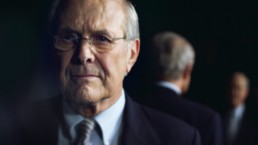Review: ‘The Unknown Known’
At once engaging, but the former secretary of defense proves too slippery a figure to recount the controversies of recent history or to tell his own story.
Donald Rumsfeld is no movie star. Which is not to say that he is not a celebrity, in his own right.
The famous (or infamous, as this just left of center documentary might appropriate), former secretary of defense under the W. Bush presidency, is no longer in the political spotlight, which, after watching The Unknown Known, could be gathered as something valued very greatly by the documentary’s star subject. As time has progressed since the Bush presidency and its proclaimed War on Terror, actuality has seemed to distance itself from history. The Iraq Wars, of which Mr. Rumsfeld acted as the principal architect of, becomes a hazier image to recount, and its particulars have likewise blurred as the story becomes buried ever so quietly amidst today’s 24-hour breaking news cycle. Which is why a documentary featuring a singular Rumsfeld, plopped in front of a vast and infinitely black backdrop to disclose to us for the first time, his political career and the controversial stories that were a part of it, would make for not only an entertaining experience but a truly informative and revealing one.
This kind of happens.
Director Errol Morris plays the interviewer himself (though not on camera) to his comfortably sitting subject, to explain to us The Unknown Knowns of his political career. If the title is slightly confusing, the documentary does a good job of defining it periodically. Ever the rational and composed man (to an eerie degree), Rumsfeld explains that (in politics) there are Known Knowns (“That is to say, we know things that we know”), Unknown Unknowns (“That is to say, there are things we don’t know we don’t know), and Unknown Knowns (…Ok the logic still fails me on this one…”That is to say, there are things we think we know that we don’t”). Morris has stated that after meeting and talking to Mr. Rumsfeld, that he knows less about him and the Iraq War then he did before. It’s not hard to sympathize with his sentiment, as the documentary, while engaging and notable for its attempts and small successes at curtain-pulling, plays like the story that Rumsfeld might have wanted you to hear, instead of Morris.
Part of Rumsfeld’s insight and foresight as a calculative (or perhaps just organized) political figure was that he even kept these detailed snowflakes of his political action, perhaps to remind himself, perhaps to put on record his own version of history, or perhaps to create the world’s strangest diary.
Morris sidesteps the conventional question and answer interview style by instead putting Rumsfeld in the hot seat, having him explain his “snowflakes”- the individually unique and enormous archive of typed letters, audio recordings, and other memos that he personally wrote/recorded during his almost fifty years in Congress, the White House, in business, and at the Pentagon. Part of Rumsfeld’s insight and foresight as a calculative (or perhaps just organized) political figure was that he even kept these detailed snowflakes of his political action, perhaps to remind himself, perhaps to put on record his own version of history, or perhaps to create the world’s strangest diary. With the actual date and time stamped accounts, Morris has Rumsfeld read and explain (not all of them- there are tens of thousands packed away in cardboard boxes. Think last scene of Raiders of the Lost Arc) a core group, focusing largely on the Iraq War memos.
While Morris is more properly (and appropriately) contextualized as a liberally leaning documentarian, his question-asking never comes across as overly spiteful or attacking- a welcome and professional stance to take. Though this might have more to do with Mr. Rumsfeld’s own penchant for creatively exercising (spinning?) vocabulary and stories to best contextualize them, perhaps for his own benefit. The audience is walked through significant events such as September 11th, the decision to invade Iraq and Afghanistan, torture and Guantanamo Bay, and much more. The highlight of the documentary is that Rumsfeld himself sits down to explain these events, yes; but either he was never personally guilty of anything himself to which he might reveal any stunning omissions that this type of journalism would find out, or he just doesn’t admit to any secret wrongdoings. In either case, I’m not sure he’d be the person you would want to play poker with.
So is this documentary even an effective and worthwhile one? I vote Aye. Morris moves the whole show along at an even and steady pace, and it’s worth it just to gain the political perspective from one of the most important men whose political action helped lead to the Iraq Wars. The biggest takeaway, in fact, ends up being not one of hearing a juicy tell-all about our recent checkered political past, but of a subtle character study, of how this man rose to power and prominence in one our country’s most uncertain of times. So if you finish the viewing feeling frustrated that you didn’t get the full peek behind the curtain, (or if that title still doesn’t make any sense to you), then for some reason I think a small and satisfactory smile would purse Rumsfeld’s lips. For when Morris lobs his final question, perhaps frustratedly, or defeatedly, “Why did you agree to sit down with me?”, Rumsfeld’s pause, and then- “I don’t know,” should give you an insight into the mystery of how this man chooses to tell his story.
Ryan Rojas
Ryan is the editorial manager of Cinemacy, which he co-runs with his older sister, Morgan. Ryan is a member of the Hollywood Critics Association. Ryan's favorite films include 2001: A Space Odyssey, The Social Network, and The Master.

